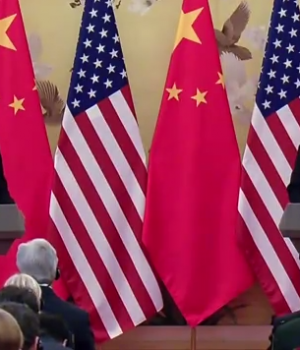Smith blasts Beijing for human rights abuses following report
WASHINGTON – Congressional-Executive Commission on China Chair Rep. Christopher Smith (R-N.J.) on Wednesday lashed out at Beijing for engaging in flagrant human rights abuses over the past year.
“This has been another dark and difficult year for Chinese rights defenders and democracy activists,” Smith said before hearing testimony from a panel of experts and dissents.
Smith’s commission recently issued a bi-partisan congressional report that included recommendations on how best the U.S. government could pressure Beijing to improve its human rights record while still maintaining strong U.S.-Chinese relations.
Sen. Marco Rubio (R-Fla.), who is the commission’s co-chair, also spoke and was accompanied by colleagues from both parties encompassing both the House and Senate.
Smith said under the regime of Chinese President Xi Jingping the government is selectively using laws to crack down on freedom of expression, religious liberty and to enforce the regime’s one-child-only policy.
Smith explained that the Chinese government has on occasion accused defense attorneys of subversion simply for representing their clients in court and that some have even been imprisoned. Smith also said that similar treatment has been applied to peaceful dissents and democracy activists.
Smith said that the Trump Administration should consider re-examining U.S.-Chinese relations with a stronger emphasis on human rights.
“The next administration faces major challenges in dealing with China,” Smith said. “A new approach is needed that learns the lessons of the past and listens to those who have suffered prisons and persecution to advance fundamental freedoms in China.”
On Wednesday morning Bloomberg News reported that Trump had selected Iowa Gov. Terry Branstad (R) to be the next U.S. Ambassador to China and as of Wednesday afternoon Branstad has reportedly accepted that offer.
Smith rejected the popular premise that Beijing’s emergent Capitalist-leaning economy would result in automatically ushering in democratic reforms.
“The problem is that U.S. diplomacy is stuck with policies that no longer match and never did match Chinese realities,” Smith said. “For the past two decades, or a little more than that, U.S. policy was based on the belief that China’s growing prosperity would somehow bring political reforms and the rule of law. That trade matriculates into fundamental freedoms.”
Penpa Tsering, who is a representative of the Tibetan spiritual leader the Dalai Lama, urged the commission to pressure Beijing to release an imprisoned 2010 Nobel Laureate and also to advocate for the rights of the Tibetan people.
“His Holiness the Dalia Lama is very concerned about the well being of the Nobel Laureate Liu Xiaobo (Peace) and demand his immediate release form incarceration,” Tsering said.
“As I present the case of Tibet before you, we Tibetans stand with our Chinese, Uygur, Falun Gong friends who are represented here and also our southern Mongolian friends who unfortunately are not represented here. We all suffer the same fate under the repressive Communist government of the Peoples Republic of China.”
Dr. Yang Jianli, who is a democracy activist, told the commission that the U.S. government does not fully understand Beijing’s political motives.
“By any standard America’s China policy has been a failure for the [better] part of three decades,” Janli said. “The primary cause of the failure has been a fundamental misunderstanding of China’s strategic objectives along with an inability on the U.S.’s part to respond to it with strategic and moral clarity.”
Janli said that the Chinese government’s number one priority is self-preservation and that the U.S. government can make use of that vulnerability by exploiting economic weaknesses.
“I recommend the following specific actions for the next administration,” Janli said. “Number one use the U.S. market as leverage. Threaten to withdraw China’s permanent trade status unless a series of improvements are made in the areas of human rights, political reform, and the demilitarization of the south and east China seas.”
This article was republished with permission from Talk Media News

Bryan is the managing editor of Baltimore Post-Examiner.
He is an award-winning political journalist who has extensive experience covering Congress and Maryland state government. His work includes coverage of the first election of President Donald Trump, the confirmation hearings of Supreme Court Justice Brett Kavanaugh and attorneys general William Barr and Jeff Sessions, the Maryland General Assembly, Gov. Larry Hogan, and the COVID-19 pandemic.
Bryan has broken stories involving athletic and sexual assault scandals with the Baltimore Post-Examiner.
His original UMBC investigation gained international attention, was featured in People Magazine and he was interviewed by ABC’s “Good Morning America” and local radio stations. Bryan broke subsequent stories documenting UMBC’s omission of a sexual assault on their daily crime log and a federal investigation related to the university’s handling of an alleged sexual assault.

